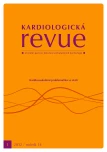Complications of cardiac pacing in group of patients with higher age
Authors:
J. Vlašínová
Authors‘ workplace:
Interní kardiologická klinika FN Brno-Bohunice
Published in:
Kardiol Rev Int Med 2012, 14(1): 27-30
Overview
Complications of cardiac pacing in group of patients with higher age. The vast majority of patiens undergoing permanent cardiac pacing, are patiens older than 75 years. Not only higher age, but frequent associated diseases creates of them a significant risk group, with which we can expect a higher percentage of complications. These patiens often suffer from chronic renal failure, heart failure, diabetes mellitus, autoimmune disease and anticoagulant therapy. From the operational complications we more often find pneumothorax and perforation of the right atrium or the right chamber of the heart. From other complications in group of patients with higher age are more common hematoma, dislocation of electrode, decubitus or infection of the pocket and infectious endocarditis.
Keywords:
permanent pacing – complications – elderly patients
Sources
1. Schmidt B, Brunner M, Olschewski M et al. Pacemaker Therapy in Very Elderly Patients: Long-term Survival and Prognostic Parameters. Am Heart J 2003; 146 : 908–913.
2. Harcombe AA, Newell SA, Ludman PF et al. Late complications following permanent Pacemaker implantation or elective unit replacement. Heart 1998; 80 : 240–244.
3. Eberhardt F, Bode F, Bonnemeier H et al. Long term complications in single and dual chamber pacing are influenced by surginal experience and patient morbidity. Heart 2005; 91; 500–506.
4. Link MS, Estes NA 3rd, Griffin JJ et al. Complications of dual chamber pacemaker implantation in the elderly. Pacemaker selection in the Elderly (PASE) Investigators. J Interv Card Electrophysiol 1998; 2 : 175–179.
5. Armaganijan LV, Toff WD, Nielsen JC et al. Are elderly Patiens at Increased Risk of Complications Following Pacemaker Implantation? A Meta-Analysis of Randomized Trials. Pacing Clin Electrophysiol 2011; Oct 31. doi : 10.1111/j. 1540-8159.2011.03240.x [Roub ahead of print].
6. Res JCJ, de Priester JA, van Lier AA et al. Pneumothorax resulting from subclavian puncture: a complication of permanent lead implantation. Neth Heart J 2004; 12 : 101–105.
7. Hirschl DA, Jain VR, Spindola-Franco H et al. Prevalence and Characterisation of Asymptomatic Pacemaker and ICD Lead Perforation on CT. Laciny Clin Electrophysiol 2007; 30 : 28–32.
8. Pavia S, Wilkoff B. The management of surgical complications of Pacemaker and Implantable cardioverter-defibrillators. Cur Opin Cardiol 2001; 16 : 66–71.
9. Aggarwal RK, Connelly DT, Ray SG et al. Early complications of permanent Pacemaker implantation: no diference between dual and single chamber system. Br Heart J 1995; 73 : 571–575.
10. Dasgupta A, Montalvo J, Medendorp S et al. Increased complication rates of cardiac rhythm management device in ESRD patients. Am J Kidney Dis 2007; 49 : 656–663.
11. Tompkins C, McLean R, Cheng A. End-Stage Renal Disease Predicts Complications in Pacemaker and ICD Implants. J Cardiovasc Electrophysiol 2011; 22 : 1099–1104.
12. Kiviniemi MS, Pirnes MA, Eränem HJ et al. Complications related to permanent Pagemaker therapy. Pacing Clin Electrophysiol 1999; 22 : 711–720.
13. Uslan DZ, Sohail MR, Sauver JL et al. Permanent pacemaker andf implantable cardioverter defibrillator infection: an population-based study. Arch Intern Med 2007; 167 : 669–675.
14. Catanchin A, Murdock CJ, Athan E. Pacemaker infection: A 10-Year Experience. Heart Lung Circ 2007; 16 : 434–439.
15. Owings J, Alexander P, Daccarett M et al. Cardiac device implantation with antibiotic pocket irrigation: an attempt to reduce infection. Heart Rhythm 2007; (Suppl): S2.
16. Beneš J, Gregor P, Mokráček A. Infekční endokarditida. Doporučené postupy diagnostiky, léčby, dispenzarizace a profylaxe. Cor Vasa 2007; 49: K157–171.
17. Jassal DS, Weyman AE. Infective Endocarditis in the Era of Intracardiac Devices: An Echocardiographic Perspektive. Rev Cardiovasc Med 2006; 7 : 119–129.
18. Ruttman E, Hangler HB, Kilo J, Hofer D et al. Transvenous pacemaker lead removal is safe and effective even in large vegetations: an analysis of 53 cases of pacemaker lead endokarditis. Pacing Clin Electrophysiol 2006; 29 : 231–236.
Labels
Paediatric cardiology Internal medicine Cardiac surgery CardiologyArticle was published in
Cardiology Review

2012 Issue 1
-
All articles in this issue
- Subclinical brain damage in older patients with hypertension and dementia
- Deep venous thrombosis and pulmonary embolism in geriatric medicine – two sides of the same coin
- New approaches to anticoagulant treatment for senior citizens with atrial fibrillation
- Complications of cardiac pacing in group of patients with higher age
- Complications of infrainguinal revascularization procedures in elderly patients
- Dyslipidemia in 2012
- Atherosclerosis of the intracranial arteries – current view, 2nd part
- An anusual diagnostics of implantable cardioverter-defibrillator lead perforation
- Cardiology Review
- Journal archive
- Current issue
- About the journal
Most read in this issue
- Complications of cardiac pacing in group of patients with higher age
- Deep venous thrombosis and pulmonary embolism in geriatric medicine – two sides of the same coin
- New approaches to anticoagulant treatment for senior citizens with atrial fibrillation
- Complications of infrainguinal revascularization procedures in elderly patients
